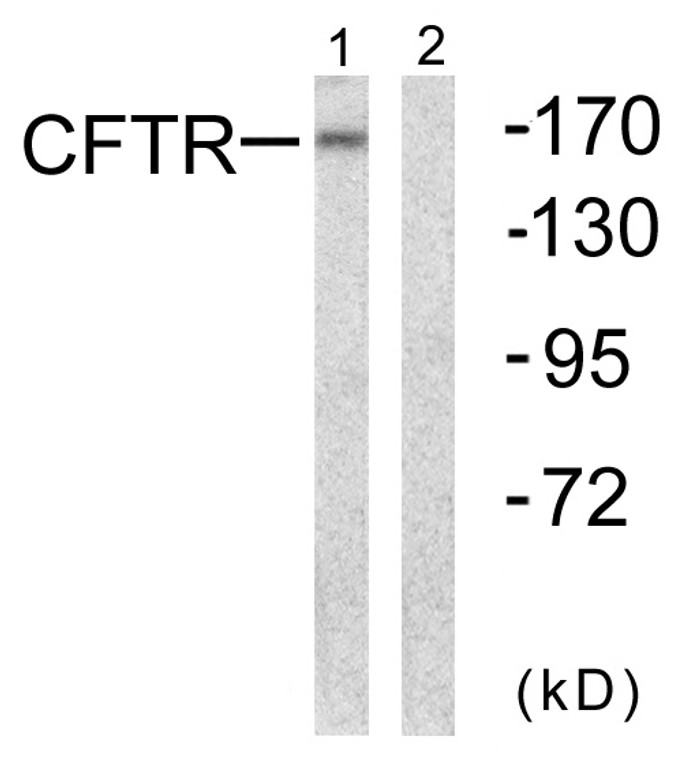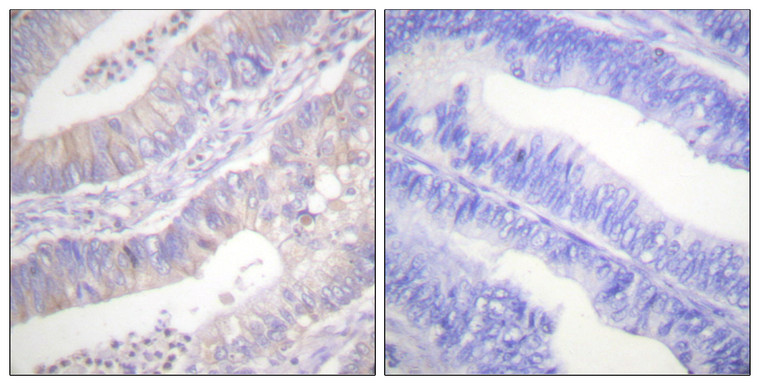| Host: |
Rabbit |
| Applications: |
WB/IHC/IF/ELISA |
| Reactivity: |
Human/Mouse/Rat |
| Note: |
STRICTLY FOR FURTHER SCIENTIFIC RESEARCH USE ONLY (RUO). MUST NOT TO BE USED IN DIAGNOSTIC OR THERAPEUTIC APPLICATIONS. |
| Short Description: |
Rabbit polyclonal antibody anti-Cystic fibrosis transmembrane conductance regulator (711-760 aa) is suitable for use in Western Blot, Immunohistochemistry, Immunofluorescence and ELISA research applications. |
| Clonality: |
Polyclonal |
| Conjugation: |
Unconjugated |
| Isotype: |
IgG |
| Formulation: |
Liquid in PBS containing 50% Glycerol, 0.5% BSA and 0.02% Sodium Azide. |
| Purification: |
The antibody was affinity-purified from rabbit antiserum by affinity-chromatography using epitope-specific immunogen. |
| Concentration: |
1 mg/mL |
| Dilution Range: |
WB 1:500-1:2000IHC 1:100-1:300ELISA 1:5000IF 1:50-200 |
| Storage Instruction: |
Store at-20°C for up to 1 year from the date of receipt, and avoid repeat freeze-thaw cycles. |
| Gene Symbol: |
CFTR |
| Gene ID: |
1080 |
| Uniprot ID: |
CFTR_HUMAN |
| Immunogen Region: |
711-760 aa |
| Specificity: |
CFTR Polyclonal Antibody detects endogenous levels of CFTR protein. |
| Immunogen: |
The antiserum was produced against synthesized peptide derived from the human CFTR at the amino acid range 711-760 |
| Post Translational Modifications | N-glycosylated. Phosphorylated.cAMP treatment promotes phosphorylation and activates the channel. Dephosphorylation decreases the ATPase activity (in vitro). Phosphorylation at PKA sites activates the channel. Phosphorylation at PKC sites enhances the response to phosphorylation by PKA. Phosphorylated by AMPK.this inhibits channel activity. Ubiquitinated, leading to its degradation in the lysosome. Deubiquitination by USP10 in early endosomes enhances its endocytic recycling to the cell membrane. Ubiquitinated by RNF185 during ER stress. Ubiquitinated by MARCHF2. |
| Function | Epithelial ion channel that plays an important role in the regulation of epithelial ion and water transport and fluid homeostasis. Mediates the transport of chloride ions across the cell membrane. Channel activity is coupled to ATP hydrolysis. The ion channel is also permeable to HCO(3)(-).selectivity depends on the extracellular chloride concentration. Exerts its function also by modulating the activity of other ion channels and transporters. Plays an important role in airway fluid homeostasis. Contributes to the regulation of the pH and the ion content of the airway surface fluid layer and thereby plays an important role in defense against pathogens. Modulates the activity of the epithelial sodium channel (ENaC) complex, in part by regulating the cell surface expression of the ENaC complex. Inhibits the activity of the ENaC channel containing subunits SCNN1A, SCNN1B and SCNN1G. Inhibits the activity of the ENaC channel containing subunits SCNN1D, SCNN1B and SCNN1G, but not of the ENaC channel containing subunits SCNN1A, SCNN1B and SCNN1G. May regulate bicarbonate secretion and salvage in epithelial cells by regulating the transporter SLC4A7. Can inhibit the chloride channel activity of ANO1. Plays a role in the chloride and bicarbonate homeostasis during sperm epididymal maturation and capacitation. |
| Protein Name | Cystic Fibrosis Transmembrane Conductance RegulatorCftrAtp-Binding Cassette Sub-Family C Member 7Channel Conductance-Controlling AtpaseCamp-Dependent Chloride Channel |
| Database Links | Reactome: R-HSA-382556Reactome: R-HSA-5627083Reactome: R-HSA-5678895Reactome: R-HSA-5689880Reactome: R-HSA-8856825Reactome: R-HSA-8856828Reactome: R-HSA-9013406Reactome: R-HSA-9613829Reactome: R-HSA-9615710Reactome: R-HSA-9646399 |
| Cellular Localisation | Apical Cell MembraneMulti-Pass Membrane ProteinEarly Endosome MembraneCell MembraneRecycling Endosome MembraneEndoplasmic Reticulum MembraneNucleusThe Channel Is Internalized From The Cell Surface Into An Endosomal Recycling CompartmentFrom Where It Is Recycled To The Cell MembraneIn The Oviduct And BronchusDetected On The Apical Side Of Epithelial CellsBut Not Associated With CiliaIn Sertoli CellsA Processed Product Is Detected In The NucleusEr Stress Induces Gorasp2-Mediated Unconventional (Er/Golgi-Independent) Trafficking Of Core-Glycosylated Cftr To Cell Membrane |
| Alternative Antibody Names | Anti-Cystic Fibrosis Transmembrane Conductance Regulator antibodyAnti-Cftr antibodyAnti-Atp-Binding Cassette Sub-Family C Member 7 antibodyAnti-Channel Conductance-Controlling Atpase antibodyAnti-Camp-Dependent Chloride Channel antibodyAnti-CFTR antibodyAnti-ABCC7 antibody |
Information sourced from Uniprot.org
12 months for antibodies. 6 months for ELISA Kits. Please see website T&Cs for further guidance











